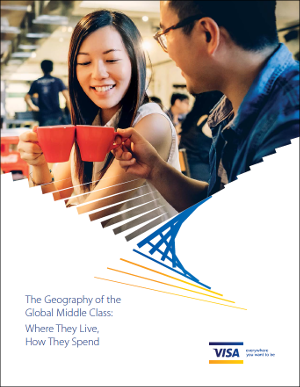Ungated Post | 16 Nov 2018
The Geography of the Global Middle Class: Where they live, how they spend

Democratization of consumption has happened so quickly, that close to two-thirds of the world’s population will join the ranks of the ‘Global Middle Class’ by 2030. The implications on consumer demand and future spending power cannot be overstated.
The reach of and effects of globalization on households and consumers is often under-represented with national statistics. When one begins to dig into the nuances of city economies, outcomes of globalization begin to take form. The growth of ‘middle-class consumers’ is more pronounced. Furthermore, research indicates that the spending behavior of middle-class consumers is slowly converging over time–meaning middle-class consumer spending in global cities such as Singapore is starting to look more like middle-class consumer spending in cities such as London and Dubai.
The effects of growth in middle-class and convergence in spending behavior, coupled with increasing access to digital payment platforms and expansion of global brands, creates new opportunities for business. Our research, in collaboration with Visa, sheds new light and details on the outlook of the global middle class and implications on the sharing economy, global brands, sectors and city economies.
Our economic consulting and thought leadership teams are world leaders in quantitative economic analysis and original, evidence-based research, working with clients around the globe and across sectors to build models, forecast markets, run extensive surveys, and evaluate interventions using state-of-the art techniques. Lead consultants on this project were:
Oxford Economics’ team is expert at applying advanced economic tools that provide valuable insights into today’s most pressing business, financial, and policy issues. To find out more about our capabilities, contact:
EMEA
Sam Moore
+44 (0)207 803 1415
Email
Paul Donnelly
+44 (0)203910 8077
Email
Americas
Hamilton Galloway
+1 (646) 503 3068
Email
Jeffrey Klonoski
+1 (646) 503 3048
Email
Asia
Peter Suomi
+65 6829 7198
Email
Related Services

Post
The economic impact of abandoning the WTO
Oxford Economics have been commissioned by the International Chamber of Commerce (ICC) to provide an independent assessment of the economic impact of WTO dissolution. This report details our findings and the assumptions underpinning our analysis.
Find Out More
Post
The economic impact of the sports activities of public service media
This study shows how the sports activities of public service media supported €4.5 billion of GDP and 57,000 jobs across 31 European countries in 2022. The report also highlights wider economic benefits of public service media sports coverage, such as the way in which it leverages sponsorship income for sports bodies.
Find Out More
Post
Global Trade Education: The role of private philanthropy
Global trade can amplify economic development and poverty alleviation. Capable leaders are required to put in place enabling conditions for trade, but currently these skills are underprovided in developing countries. For philanthropists, investing in trade leadership talent through graduate-level scholarships is an opportunity to make meaningful contributions that can multiply and sustain global economic development.
Find Out More